We have to deal with the twin effects of getting Covid down to manageable proportions and getting all the rest of health and medical science back on track. Cancer, heart disease and other serious health problems have not gone away, and there are backlogs as a result of Covid we will need to deal with rapidly.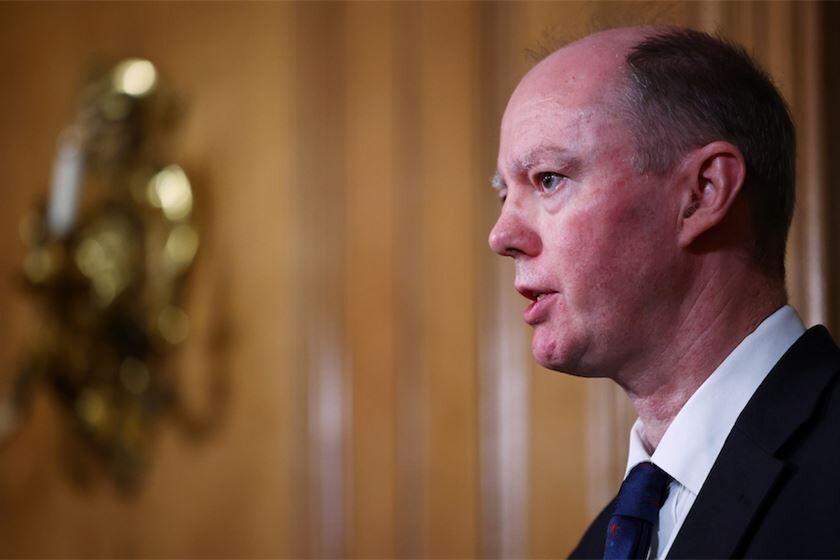
These two themes of Covid and non-Covid health will dominate 2021, and whilst an exit is in sight it is still some way off, and we have paid a heavy price in healthcare postponed.
Prof Chris Whitty, chief medical officer
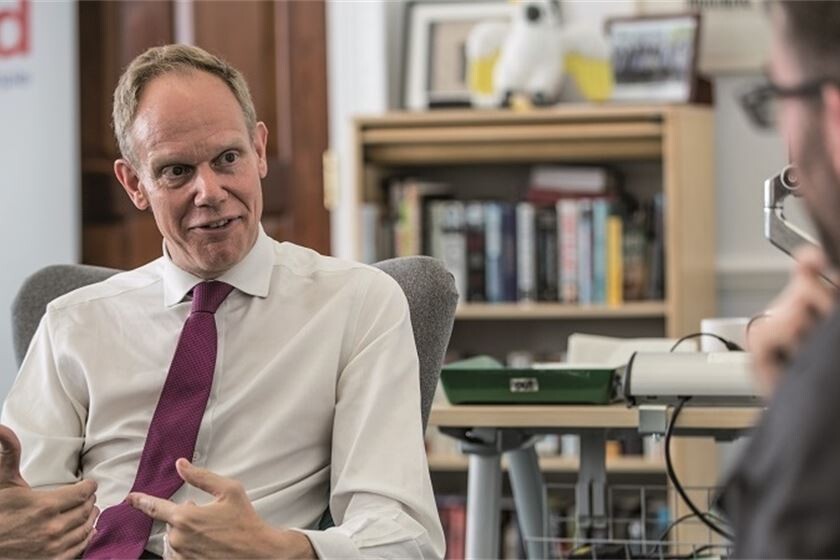 I think capturing the opportunities that will come up at the end of the EU transition period is the main one, including reforming our country’s asylum system. And, as always for the Home Office, being aware of and anticipating the threats and risks to our country and the most vulnerable people in our communities.
I think capturing the opportunities that will come up at the end of the EU transition period is the main one, including reforming our country’s asylum system. And, as always for the Home Office, being aware of and anticipating the threats and risks to our country and the most vulnerable people in our communities.
Matthew Rycroft, permanent secretary, Home Office
You may have recently heard the wonderful news that the attorney general Suella Braverman is expecting a baby in the new year! That, of course, presents a range of challenges: for the attorney trying to get some sleep while on maternity leave; and for us in getting a new interim AG up to speed.
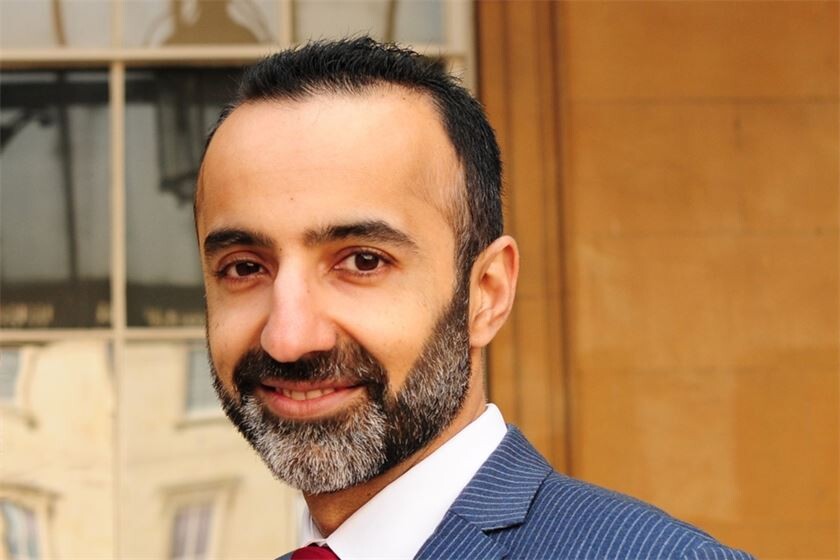 In addition to that, the competition for a new AGO director general will go live in the new year, a new Treasury solicitor is likely to be named in January, and a new chief inspector of the Crown Prosecution Inspectorate announced in spring. Changes at the top of departments always present exciting opportunities, and with all these new roles coming online within the space of a few months, it’s a brilliant chance to shape the future direction of these organisations.
In addition to that, the competition for a new AGO director general will go live in the new year, a new Treasury solicitor is likely to be named in January, and a new chief inspector of the Crown Prosecution Inspectorate announced in spring. Changes at the top of departments always present exciting opportunities, and with all these new roles coming online within the space of a few months, it’s a brilliant chance to shape the future direction of these organisations.
Shehzad Charaniam, interim director general, Attorney General's Office
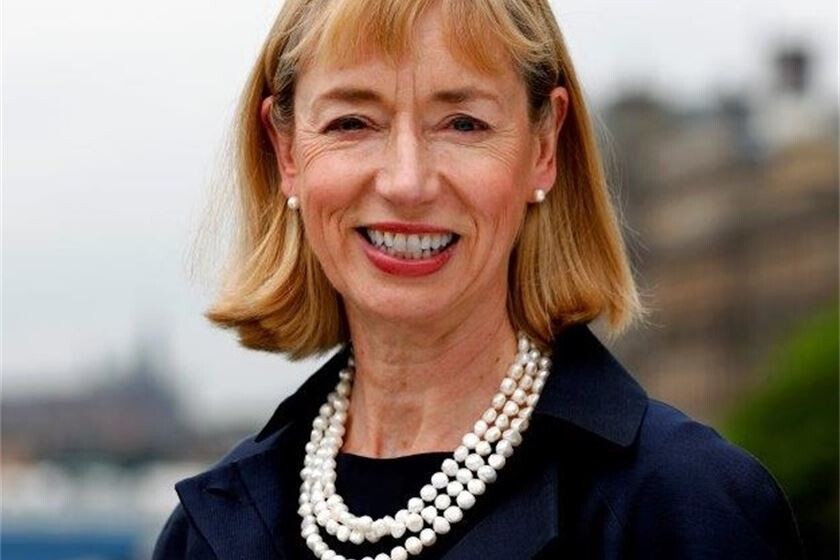 The Scottish Government faces the significant, concurrent risks of managing the continued response to Covid-19 and the impact of EU exit, alongside a Scottish winter and its impact on health and transport services. Ensuring our organisation, the wider public sector, businesses and society have the information they need to meet these challenges is crucial. Our organisation must be ready for the outcome of next year’s Scottish Parliament elections too.
The Scottish Government faces the significant, concurrent risks of managing the continued response to Covid-19 and the impact of EU exit, alongside a Scottish winter and its impact on health and transport services. Ensuring our organisation, the wider public sector, businesses and society have the information they need to meet these challenges is crucial. Our organisation must be ready for the outcome of next year’s Scottish Parliament elections too.
Leslie Evans, permanent secretary, Scottish Government
 The main challenge facing the government in the coming year is clear, we must rebuild Britain and fuel economic recovery across the country following Covid-19. I am pleased to see that the government is committed “to using this crisis to tackle this country’s great unresolved challenges of the last three decades”.
The main challenge facing the government in the coming year is clear, we must rebuild Britain and fuel economic recovery across the country following Covid-19. I am pleased to see that the government is committed “to using this crisis to tackle this country’s great unresolved challenges of the last three decades”.
The IPA will play a vital role in this and I am looking forward to supporting the delivery of an infrastructure revolution that will help level up the country, strengthen the union, and put the UK on the path to net zero emissions by 2050.
Nick Smallwood, Infrastructure and Projects Authority chief executive
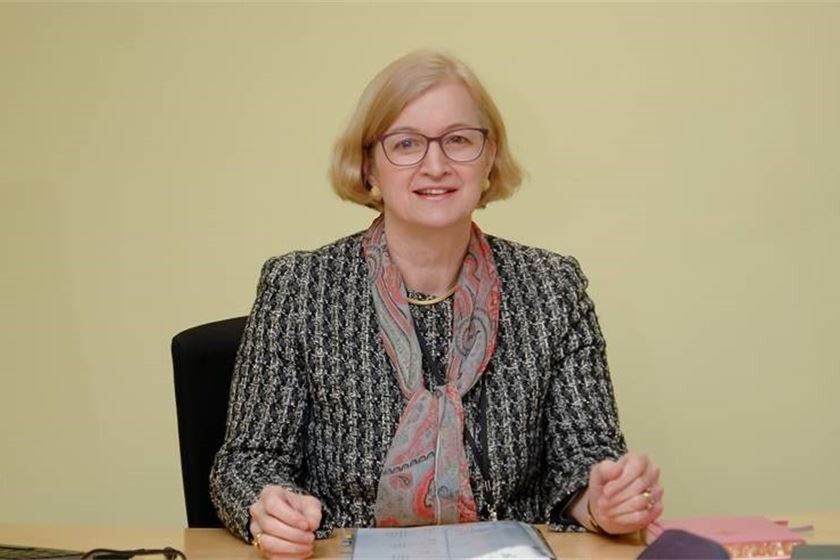
We will be resuming our normal role, which has its own challenges. People have realised it’s much easier to turn something off than to turn it back on again. We do, however, have the capacity to plan well and to get right. But so much of what we’ve seen over the last year has shown us again how much parents, especially, value what we do.
Amanda Spielman, chief inspector, Ofsted
 With the roll out of effective vaccines, perhaps like the rest of the world, the main challenge we will face is getting back on track, back to a sense of normality, back to focusing on our future plans. I am very much looking forward to launching our new and ambitious strategic plan in early 2021. This will see, among other things, the further development of our digital services, which have been such a big part of our Covid resilience.
With the roll out of effective vaccines, perhaps like the rest of the world, the main challenge we will face is getting back on track, back to a sense of normality, back to focusing on our future plans. I am very much looking forward to launching our new and ambitious strategic plan in early 2021. This will see, among other things, the further development of our digital services, which have been such a big part of our Covid resilience.
Julie Lennard, chief executive, DVLA
Alongside the obvious challenges of delivering the vaccines programme and managing the continuing risks of Covid-19 infection, many departments will be dealing with the knock-on impact on demand for public services. 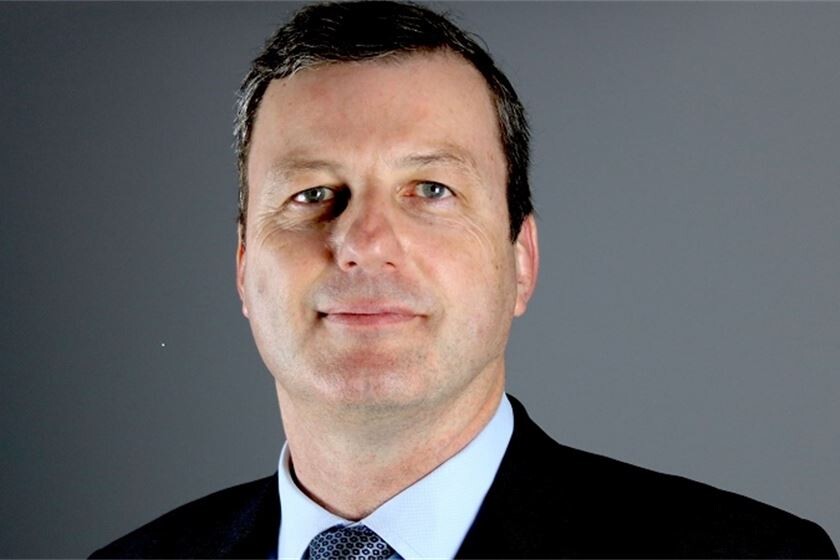
The financial sustainability of key public services at local level will continue to be a concern following recent high profile financial failures. We also need to be aware of the impact on our people of our collective experience in 2020 – recovery and resilience will need close attention.
Gareth Davies, comptroller & auditor general, National Audit Office

What are the main challenges facing the network in the coming year? Maintaining momentum into the new world where we will have to find a balance between the online offer that has been in place for most of this year and the new way of working that we are likely to develop into, involving returning to face-to-face events that are based in a location. There’s a danger that we will slip back into only being able to provide support for people who are based in one of the big cities where there’s a presence, but I feel that it’s really important that we don’t do that.
Kate Hughes, chair of the Civil Service LGBT+ Network
 We have three main challenges: new responsibilities following EU exit, local authorities being short of resource in their food teams, and the need to regulate the most influential food businesses – especially the digital platforms – better. You can tell from the food standards debate that this is going to put us right into the spotlight. But in all of the three challenges, we’ll be putting the consumer interest above all others, to make sure that food can be trusted.
We have three main challenges: new responsibilities following EU exit, local authorities being short of resource in their food teams, and the need to regulate the most influential food businesses – especially the digital platforms – better. You can tell from the food standards debate that this is going to put us right into the spotlight. But in all of the three challenges, we’ll be putting the consumer interest above all others, to make sure that food can be trusted.
Emily Miles, chief executive, Food Standards Agency
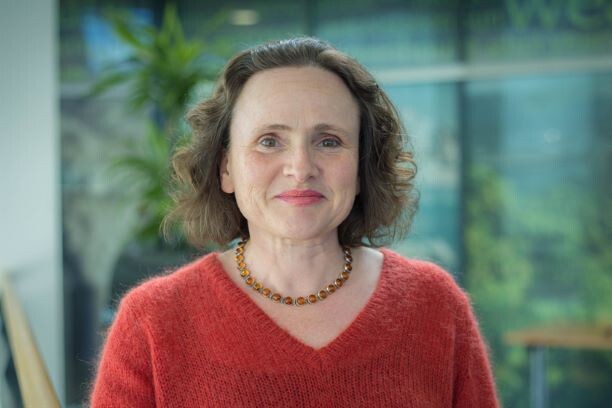 2021 looks to be a busy year for the Met Office. Rebounding from the impacts of Covid-19, we need to finalise a realistic roadmap to meet our net-zero ambitions for 2050. This is likely to require changes to our buildings, travel and even more changes to how we work, and I am sure incorporating the experience gained from 2020 will help us meet the scale of the considerable challenge ahead.
2021 looks to be a busy year for the Met Office. Rebounding from the impacts of Covid-19, we need to finalise a realistic roadmap to meet our net-zero ambitions for 2050. This is likely to require changes to our buildings, travel and even more changes to how we work, and I am sure incorporating the experience gained from 2020 will help us meet the scale of the considerable challenge ahead.
COP26 is being held in Glasgow at the end of 2021 and we will be doing all we can to support the government’s effort to raise awareness and ambition around the world to tackle global climate change in the run up to this pivotal climate event.
Prof Penelope Endersby, chief executive, Met Office
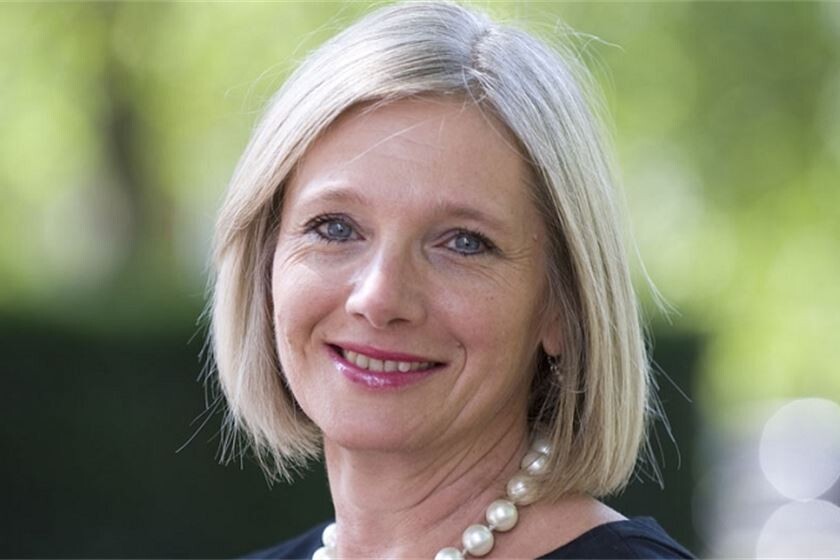 Charities must play an important role in helping society build back from the pandemic, and government needs them as a partner in reaching all parts of our society. But many are themselves in very difficult circumstances – because of restrictions on traditional fundraising methods, thousands of individual charities have suffered significant reductions to their income, while demand on their services has, in many cases, increased. Having said this, the pandemic has also proven to be a spur – if an unwelcome one - to increased innovation and creativity, with charities adapting and responding in remarkable ways to a range of needs in society.
Charities must play an important role in helping society build back from the pandemic, and government needs them as a partner in reaching all parts of our society. But many are themselves in very difficult circumstances – because of restrictions on traditional fundraising methods, thousands of individual charities have suffered significant reductions to their income, while demand on their services has, in many cases, increased. Having said this, the pandemic has also proven to be a spur – if an unwelcome one - to increased innovation and creativity, with charities adapting and responding in remarkable ways to a range of needs in society.
Helen Stephenson, chief executive, Charity Commission
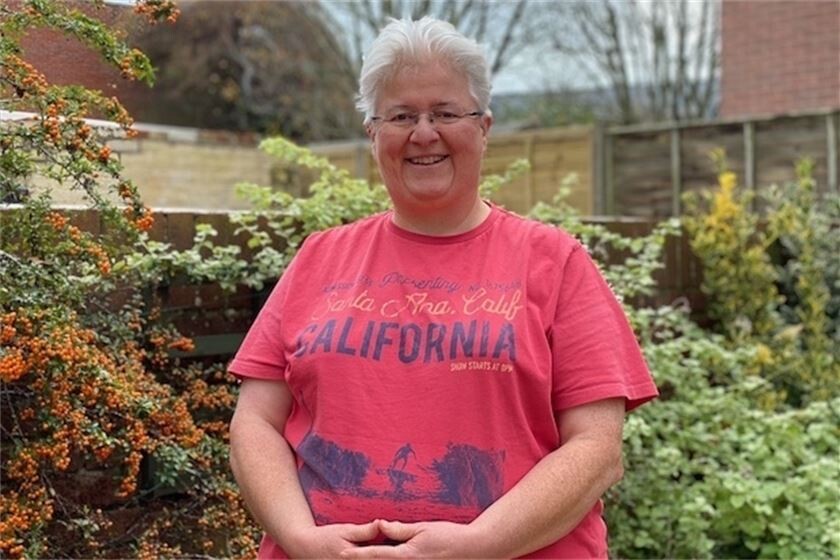 The biggest challenge for leaders in the civil service is to ensure that the gains that have been made over the past year, in terms of working from home, being flexible in how staff work, and having the right IT in place, are not lost. Since much of this is in place already I’m hopeful it is something that can continue into 2021 and beyond.
The biggest challenge for leaders in the civil service is to ensure that the gains that have been made over the past year, in terms of working from home, being flexible in how staff work, and having the right IT in place, are not lost. Since much of this is in place already I’m hopeful it is something that can continue into 2021 and beyond.
Sue Reeves, chair, Civil Service Disability Network

The UK’s transition from the EU also brings a raft of important new devolved powers and tasks at a time when our organisation is already severely stretched by the Covid-19 crisis. We have elections in Wales next May which will bring new challenges and excitement! And I’m very conscious that at some point we’ll all be held publicly accountable for the complex and difficult decisions taken throughout the pandemic.
Dame Shan Morgan, permanent secretary, Welsh Government
The welcome challenge is the opportunity to build back greener and take the opportunities outside the  EU to make the changes to support our environment. We will make progress in our new approach to rewarding farmers and land managers to improve the environment, in building flood defences to protect against the impact of climate change, to plant trees and restore our peatland to capture carbon.
EU to make the changes to support our environment. We will make progress in our new approach to rewarding farmers and land managers to improve the environment, in building flood defences to protect against the impact of climate change, to plant trees and restore our peatland to capture carbon.
Tamara Finkelstein, permanent secretary, Department for Food, Environment and Rural Affairs
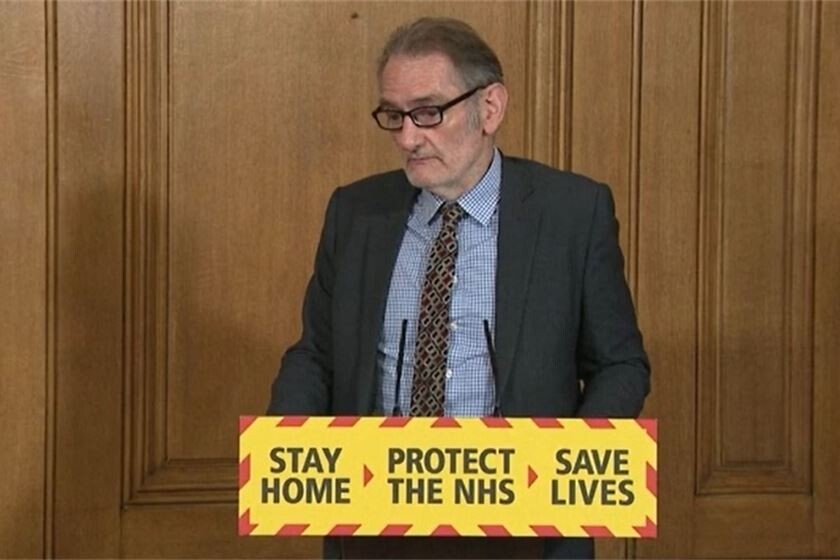
The coming year will require continual innovation to provide timely insights to decision makers and the public as we enter into the next phase of the pandemic. Beyond this, Census 2021 goes live next year. It will be the first of its kind using digital platforms as its primary medium of delivery. This in itself presents a new set of exciting opportunities and challenges to overcome.
Prof Sir Ian Diamond, UK national statistician
Simon Case, the head of the civil service and Alex Chisholm, the chief operating officer,have both made clear how important it is that the civil service reflects the diversity of our population we seek to serve: whether that be through our ethnic composition, socioeconomic background or geographical location.
A key challenge for CSRF will be how to ensure that the promotion of race equality and inclusion is embedded across these aims, whether that be through organising digital training and project management workshops or identifying opportunities for how “levelling up” can benefit regional BAME communities.
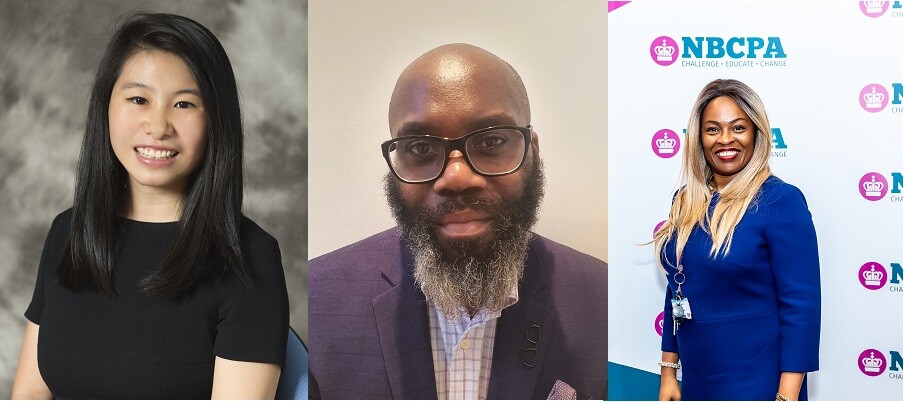 As the world recovers from the pandemic, our support to colleagues transitioning back into physical office spaces and potential new forms of hybrid working will also be key.
As the world recovers from the pandemic, our support to colleagues transitioning back into physical office spaces and potential new forms of hybrid working will also be key.
Sharon Lo, Justin Placide, and Grace Moronfolu, co-chairs and deputy chair of the Civil Service Race Forum, respectively
 If 2020 has proved anything, it’s that you can’t always be sure what’s coming next, but it’s fair to say we have plenty coming up. Right now, we’re focusing on continuing to support the EU transition and the Covid-19 response through our role as leaders of the digital, data and technology function.
If 2020 has proved anything, it’s that you can’t always be sure what’s coming next, but it’s fair to say we have plenty coming up. Right now, we’re focusing on continuing to support the EU transition and the Covid-19 response through our role as leaders of the digital, data and technology function.
We will continue to provide the public with better, more personalised public services, so you can expect us to be building on our work to deliver GOV.UK Accounts in the coming weeks and months.
Fiona Deans, interim director general, Government Digital Service
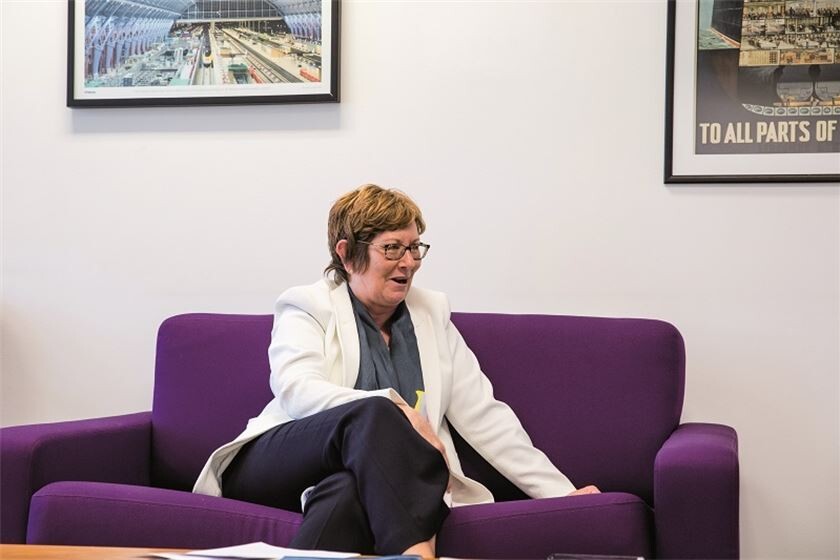 There’s a lot of uncertainty about how transport will recover post-Covid – for example, how much long-term change we will see in commuting – so we need to work this through. Transport plays a huge part in decarbonisation and levelling up so we are going to be busy. And of course, we’ll be grappling with what the new normal feels like in DfT post-Covid – trying to make some of the good changes we’ve seen, like more flexible working, and improvements in senior visibility and on inclusion, stick.
There’s a lot of uncertainty about how transport will recover post-Covid – for example, how much long-term change we will see in commuting – so we need to work this through. Transport plays a huge part in decarbonisation and levelling up so we are going to be busy. And of course, we’ll be grappling with what the new normal feels like in DfT post-Covid – trying to make some of the good changes we’ve seen, like more flexible working, and improvements in senior visibility and on inclusion, stick.
Bernadette Kelly, permanent secretary, Department for Transport
 We are answering the question “what next” for the country’s industrial strategy after the end of the transition period. We have got some chunky legislation coming down the pipe too. So I think we will have plenty of interesting challenges to keep us busy. I also want to make sure we keep having the important conversations 2020 has triggered: on diversity and inclusion (especially as it applies to black people); on new ways of working in and out of the office; and on delivering brilliantly for the whole of the UK.
We are answering the question “what next” for the country’s industrial strategy after the end of the transition period. We have got some chunky legislation coming down the pipe too. So I think we will have plenty of interesting challenges to keep us busy. I also want to make sure we keep having the important conversations 2020 has triggered: on diversity and inclusion (especially as it applies to black people); on new ways of working in and out of the office; and on delivering brilliantly for the whole of the UK.
Sarah Munby, permanent secretary, Department for Business, Energy and Industrial Strategy
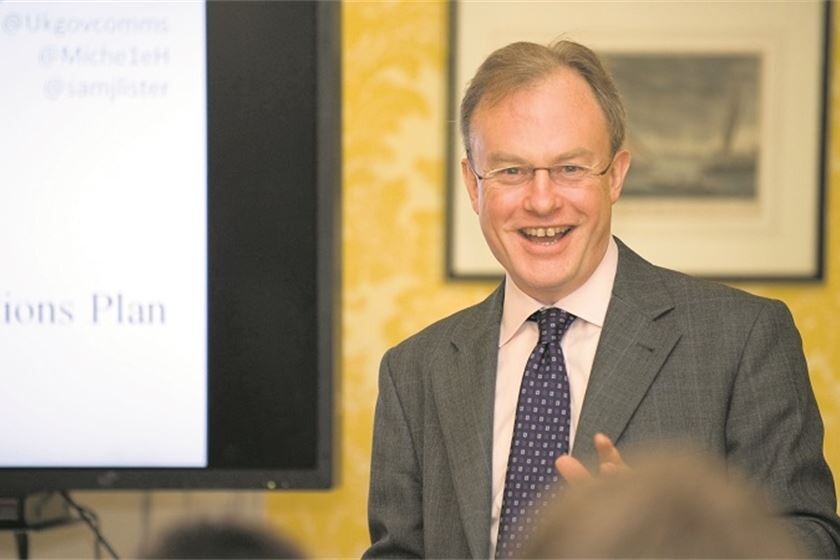 I hope that 2021 will be very different to 2020. But there are some good things that we will take out of the last year for the future. These include routinely using technology to run our meetings, far greater efforts to collaborate together and more working from home. All of which I believe will contribute to a more efficient public service. We were really proud that we were able to run a successful Civil Service Live online this year, which attracted record numbers of participants and launched the new drive to modernise the civil service. I will also be concentrating on how we improve government communication through our “Reshaping GCS” programme, which will create a more united, effective and better skilled profession.
I hope that 2021 will be very different to 2020. But there are some good things that we will take out of the last year for the future. These include routinely using technology to run our meetings, far greater efforts to collaborate together and more working from home. All of which I believe will contribute to a more efficient public service. We were really proud that we were able to run a successful Civil Service Live online this year, which attracted record numbers of participants and launched the new drive to modernise the civil service. I will also be concentrating on how we improve government communication through our “Reshaping GCS” programme, which will create a more united, effective and better skilled profession.
Alex Aiken, executive director of government communications